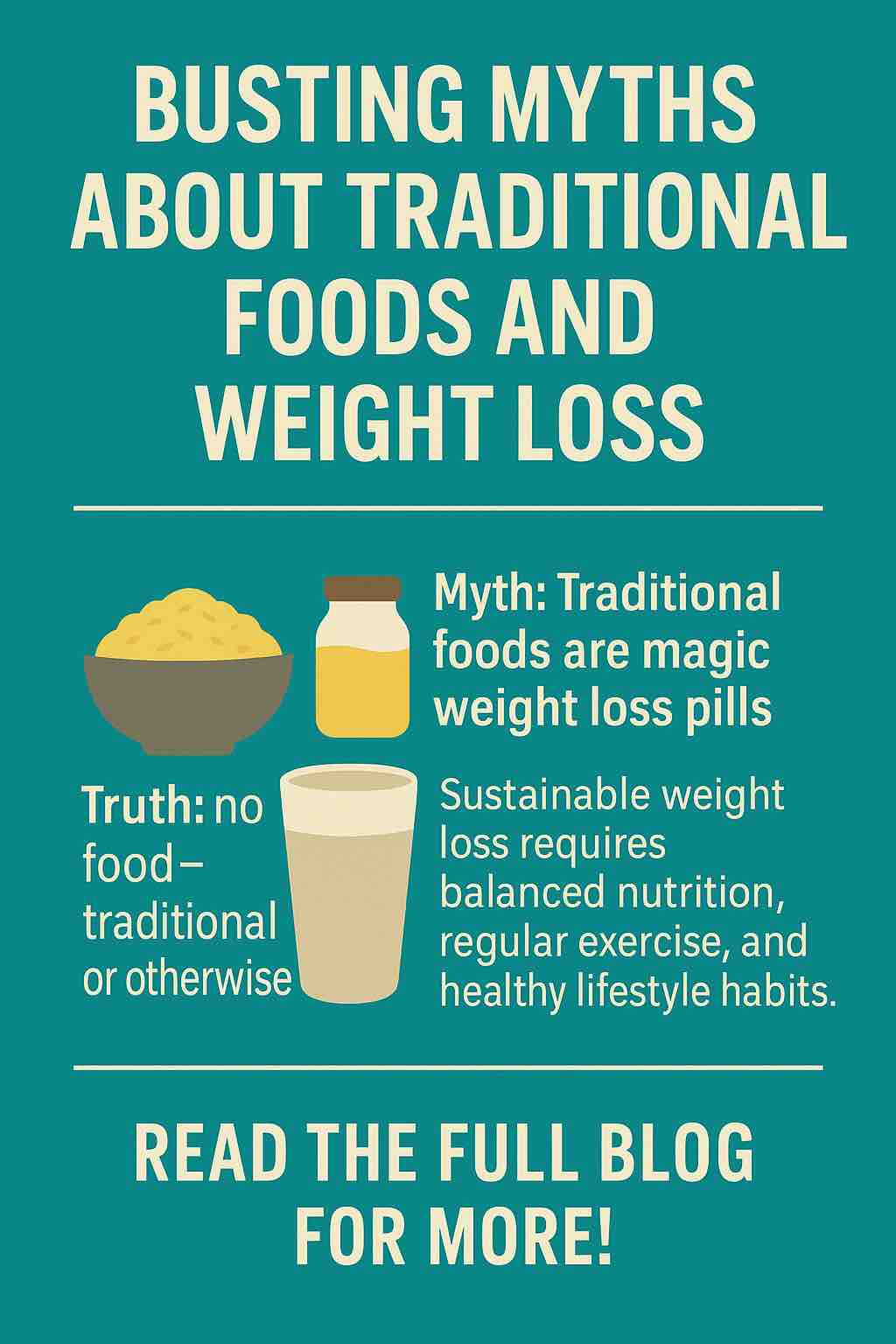
In today’s wellness landscape, traditional foods are often marketed as secret weapons for effortless weight loss. From ancient grains to herbal teas, these time-tested ingredients are being hailed as “natural fat burners” or “metabolism boosters.” But how much of this is true, and how much is just clever marketing?
In this post, we’re setting the record straight by busting six common myths about traditional foods and their role in weight loss. Whether you’re sipping green tea, adding turmeric to everything, or considering a traditional diet overhaul, this guide will help you separate science from storytelling.
Myth 1: Traditional Foods Are Magic Weight Loss Pills
The Truth:
There’s no food—traditional or otherwise—that melts fat on its own. While ingredients like fenugreek, lentils, or fermented foods can support your health, weight loss is a complex equation involving calorie balance, metabolism, and lifestyle factors.
Why It Matters:
Relying on a single food or spice can lead to disappointment and neglect of other key elements like balanced nutrition and physical activity.
Takeaway:
Traditional foods can support your journey, but they’re tools, not miracles.
Myth 2: Traditional Foods Work the Same for Everyone
The Truth:
Each person’s body responds differently to foods based on genetics, gut microbiome, hormonal profile, and overall health. What works wonders for one may have little to no effect for another.
Why It Matters:
Chasing someone else’s “magic” food can lead you away from discovering what actually works for your body.
Takeaway:
Weight loss is not one-size-fits-all—personalization is key.
Myth 3: If It’s Healthy, More Is Better
The Truth:
Even nutrient-dense traditional foods like nuts, ghee, or honey can lead to weight gain when consumed in excess. “Healthy” does not mean “calorie-free.”
Why It Matters:
Overeating anything—even traditional superfoods—can derail your progress.
Takeaway:
Portion control and balance are non-negotiable for lasting results.
Myth 4: All Traditional Foods Have Proven Weight Loss Benefits
The Truth:
Not all traditional foods are backed by modern science. While some like green tea or chili peppers show modest weight-related benefits, others are still supported more by anecdotal or cultural claims.
Why It Matters:
Blindly following trends can result in disappointment or poor health choices.
Takeaway:
Be informed—combine tradition with research.
Myth 5: You Don’t Need Exercise If You Eat the Right Traditional Foods
The Truth:
Nutrition and movement are partners. While diet accounts for a significant portion of weight loss, physical activity supports metabolism, muscle maintenance, and mental health.
Why It Matters:
Skipping exercise makes it harder to sustain weight loss over the long term.
Takeaway:
Traditional foods complement, not replace, exercise.
Myth 6: Eating Traditional Foods Guarantees Weight Loss
The Truth:
Incorporating traditional foods is just one part of a successful strategy. Without attention to overall caloric intake, lifestyle habits, and consistency, even the healthiest diet won’t deliver lasting change.
Why It Matters:
Expecting guaranteed results leads to frustration and may cause you to give up prematurely.
Takeaway:
Weight loss is multifaceted, and no food guarantees success.
How to Use Traditional Foods the Right Way for Weight Loss
- Incorporate mindfully: Use traditional foods like lentils, whole grains, fermented vegetables, or herbal infusions to support digestion, fullness, and nutrient density.
- Stay research-informed: Look at current studies and proven benefits rather than relying solely on tradition or influencer hype.
- Balance is everything: Pair these foods with other pillars—movement, stress management, and adequate sleep—for a sustainable strategy.
Final Thoughts
Traditional foods offer more than just nostalgia—they bring cultural richness and, in some cases, health-promoting nutrients. But when it comes to weight loss, context is everything. No single food is a silver bullet. Long-term success comes from sustainable habits, balanced choices, and a plan tailored to your body.
Stay tuned for the final post in our series, where we’ll recap everything you’ve learned and help you build your personalized roadmap to weight loss using the best of traditional wisdom and modern science.
Frequently Asked Questions (FAQs)
1. Can traditional foods really help with weight loss?
Yes, some traditional foods can support weight loss by promoting satiety, improving digestion, or boosting metabolism—but they work best as part of a balanced diet and active lifestyle.
2. Are traditional foods healthier than modern processed foods?
Generally, traditional foods are less processed and richer in nutrients, making them healthier. However, “traditional” doesn’t automatically mean low-calorie or ideal for weight loss.
3. How do I know if a traditional food has scientific backing?
Check for peer-reviewed studies or reliable sources like health journals, academic institutions, or registered dietitians. Avoid relying solely on anecdotal claims or social media trends.
4. Do I need to eat only traditional foods to lose weight?
Not at all. Weight loss depends on overall calorie balance, nutrient intake, and lifestyle. Traditional foods can be part of your strategy, but don’t need to be exclusive.
5. Are there traditional foods I should avoid while trying to lose weight?
Some traditional foods—like those high in sugar, refined carbs, or fats (e.g., fried snacks, sweets, excess ghee)—can hinder weight loss if eaten in excess.
6. What are examples of traditional foods that support weight management?
Examples include whole grains (millets, quinoa), legumes (lentils, chickpeas), fermented foods (kimchi, yogurt), and herbs like turmeric and ginger.
7. Can I lose weight without exercising if I eat traditional foods?
Unlikely. Exercise plays a crucial role in burning calories, maintaining muscle, and supporting long-term health. Diet alone rarely leads to sustainable weight loss.
8. Is it okay to eat traditional desserts or sweets while losing weight?
Yes, in moderation. Focus on portion control and consider healthier versions made with natural sweeteners or whole ingredients.
9. How do I incorporate traditional foods into a modern diet?
Blend traditional meals with modern nutritional practices—like portion control, balanced macronutrients, and cooking methods that minimize added fats or sugars.
10. Where can I learn more about how to use traditional foods effectively for weight loss?
Our blog series explores this in depth—check out previous posts for food-specific insights and stay tuned for our final roadmap guide.









